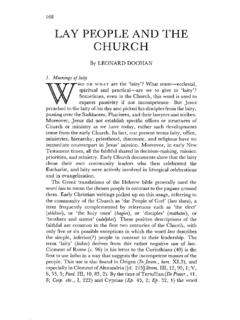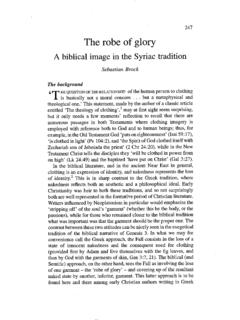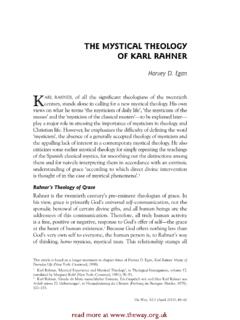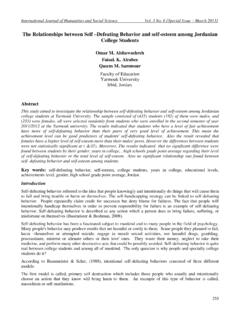Transcription of Ignatian Spirituality and the Rebuilding of Self …
1 The Way, 45/1 (January 2006), 66-78 Ignatian Spirituality AND THE Rebuilding OF self - esteem Beth R. Crisp F ALL THE RELATIONSHIPS IN MY LIFE, one that has been among the most difficult is the relationship with myself; overcoming low self -confidence is an ongoing struggle. One might contend that self -denigration is a form of self -mutilation, and at times it has been a powerfully destructive force in my life. All too often, low self - esteem has limited the opportunities available to me, and has had an impact on the relationships with significant others in my life, including God. It has even been suggested that it has been one of the inordinate attachments from which I have needed liberating (Exx 23).
2 While the problem is now much less severe than it has been, maintaining a functional level of self - esteem requires ongoing effort. In this paper, it is my aim to tell of my own journey into Ignatian prayer, using illustrations from my own journals, and to explain why it has become important in my efforts to preserve a sense of my own Journey into Prayer My forays into Ignatian Spirituality began when I was a doctoral student. Somewhat to my surprise, what began as just another intellectual exploration slowly moved to being a transformational experience. Finally I had found a Spirituality which seemed to be a good fit with the person that I was.
3 In time, this attraction led to an experience of the full Spiritual Exercises made in daily life (nineteenth Annotation). Since then, I have had periods of regular spiritual direction and been on a few individually guided residential retreats. 1 This article is based on the personal experiences of the author, who has made the Spiritual Exercises; it is not a theoretical analysis of the content of the Spiritual Exercises as developed by Ignatius. OIgnatian Spirituality and the Rebuilding of self - esteem 67 What began as wanting to learn about Ignatian Spirituality became a way of life in which prayer is central. One day it dawned on me that the Ignatian approach to prayer and Spirituality was not only helping me develop my relationship with God, but was also having positive side effects on my mental health, especially as regards self - esteem , an observation that is borne out by some empirical studies that point to an association between self - esteem and faith Healthy self - esteem can, of course, degenerate into mere selfishness, and some Christian traditions are very much preoccupied with forestalling this Much in our culture encourages a crude form of self -gratification, and caution is certainly appropriate.
4 But it remains the case that a degree of self - esteem is necessary if we are to affirm that God not only loves and accepts us as individuals but also invites us to serve in partnership with Jesus in the great project of the Kingdom (Exx 95). Among the many features of Ignatian Spirituality , I explore here a few that have been particularly significant for me and my journey: the use of the imagination; the colloquy; and the examination of consciousness. I have also found myself exploring how confession of sins can occur in a way that is not self -denigrating. ImaginationIt would be difficult to envisage an experience of the Spiritual Exercises in which the imagination was not invoked.
5 Even a quick glance through Ignatius instructions reveals a number of exercises that invite retreatants to use their imagination in order to develop their relationship with God: The point is to have your own picture, the image that arises in your imagination when you have put yourself in the hands of the Holy Spirit in prayer. That will be the picture that belongs to your relationship to God as you pray over this mystery. It could be a busy 2 See, for example, Paul J. Watson, Ralph W. Hood, Ronald J. Morris and James R. Hall, Religiosity, Sin and self - esteem , Journal of Psychology and Theology, 13 (1985), 116-128. 3 See for example William E. Andersen, self - esteem , self and Sin , Journal of Christian Education, 42 (1998), 25-36; and John Makujina, The Second Greatest Commandment and self - esteem , TheMaster s Seminary Journal, 8 (1997), 211-225.
6 68 Beth R. Crisp motorway or it could be a starlit footpath: either could be the setting in which God chooses to communicate with grown up in a Christian tradition where the emphasis is much more on the rational, I found this use of the imagination new, important and distinctive. As Lavinia Byrne has written: When the imagination wanders freely into a scene .. constraints fall away.
7 In their place come an intimacy and immediacy which visit and heal our most distorted images and understandings. Jesus walks in our landscape, comes into our home, is our brother, our lover, our friend. The Gospels are peopled with our own friends and enemies; we choose to follow the Lord and walk the way of Calvary. We stand at the foot of the cross and wait in the garden for my own experience, however, the matter is not quite as neat and tidy as that quotation suggests. Praying imaginatively, even when it leads to interesting and helpful insights, has sometimes taken me to difficult places, and I have needed comfort and reassurance from those who have been accompanying me on this journey of exploration.
8 Nevertheless, despite such discomfort, activating the imagination in Ignatian prayer has aided psychological reconstruction by opening my eyes to new form of prayer which Ignatius included in his Exercises is the colloquy, or conversation, with God. This form allows the individual to say quite frankly what is on their mind, and to imagine what God s response might be. I wrote the following colloquy a couple of days into a week-long retreat. An astute director, sensing difficulties in this area, encouraged me to spend some time contemplating what God s image of me might be. To this end, it was suggested that I read the parable of the man who 4 Margaret Hebblethwaite, Way of St Ignatius: Finding God in All Things (London: Fount Paperbacks, 1999 [1987]), 54.
9 5 Lavinia Byrne, The Spiritual Exercises: A Process and a Text , in The Way of Ignatius Loyola: Contemporary Approaches to the Spiritual Exercises, edited by Philip Sheldrake (London: SPCK, 1991), 24. 6 Andrew Brink, Creativity as Repair: Bipolarity and its Closure (Hamilton, Ontario: Cromlech Press, 1982). Ignatian Spirituality and the Rebuilding of self - esteem 69 found a pearl of great value and sold all of his possessions so that he could purchase it (Matthew 13:45-46). I was obviously supposed to think that God considered me to be that pearl. Instead, however, I somehow found myself being drawn to the seemingly accusatory sounding voice of God asking Adam in the garden, who told you?
10 (Genesis 3:11).I started to explore this tension between these two senses of how God might imagine me, with no idea as to where the exploration might take me. What resulted was the following dialogue, an imagined conversation between God and a woman like myself: God: And who told you that you were not beautiful? .. that you are not a delight to behold? .. that you are not good enough for my love? .. that I would not put myself out for you? .. that you are not a pearl that I value highly? Woman: I can t recall who told me, but why shouldn t I have believed them? Where were you when I was abused?7 Where were you on the numerous occasions the world misunderstood me and treated me with disdain?














